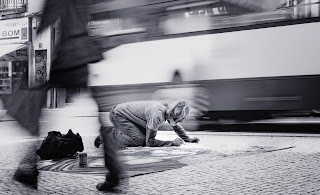In the photography the concepts of aperture, shutter speed
and ISO are of utmost importance, as well is the relationship between them. The key to achieve a
technically good shot
entirely depends on the values of these three elements, which the improper use of any of these elements leads to the wrong functioning of the
other ones. Conversely
, if you set the correct values of the three elements , achieving a
technically correct picture
is guaranteed ( do not confuse with technically correct aesthetic or creative ones ) . The camera has
various shooting modes, which it more or less regulates the correlation between
aperture , shutter speed and ISO. For example, when you are on full automatic mode , the camera sets the
values that are appropriate for
lighting conditions . In mode Aperture mode , you set the value of the size of
the aperture (F 1,8; F4 or F 20 , for example) as well as ISO and camera sets the shutter speed
, again taking into account the lighting conditions . The same goes for shutter
speed mode, but you are in charge of the speed - 1s . ,
1/200 sec. , 1/8000 sec. But here
comes the most interesting mode , namely the manual shooting mode . Called
manual because it
depends entirely on what values you will assign to the three elements . And as it is understood in
this mode you can fail in
many shots , but on the other hand, it allows you to be more creative and to think out of the. I personally shoot only in this mode , which
after many unsuccessful
frames
it allowed me to fully adjust the
value and opportunities to get to know your body ( !?!:) .
APERTURE
 |
| Photography lessons for beginners |
Shortly,
the aperture regulates
the amount of light that falls onto the light - sensitive matrix. When the
aperture is more open, such as F 1,8; F 2 or F4 with certain lenses , more
light reaches the image sensor and vice
versa. When the aperture is closed, the less light reaches the sensor. On
exactly the same principle works and the human eye , when it is very bright , your pupil shrinks ,
allowing less light to reach the nerve. For how much is the aperture will be open also depends what part of
the image will be on
focus . Depending on the size of the aperture and the amount of light to
achieve technically correct picture
, you can adjust the shutter speed.
SHUTTER
SPEED
The shutter speed is the time at which light travels when it enters in the lens until
it reaches the
matrix. It is called
shutter speed because device,
which allows light to reach
the matrix is called shutter
or curtain. Simply put , the shutter speed is the time during which this shutter or curtain is open .
The longer time it is
open , more light will reach the sensor , and vice versa. For example, you set
the aperture to say F 8 in a normal sunny day. To make a nice shot without to blur something you need a high shutter speed such as 1/ 200
of a second. But if you want to achieve a certain motion effect , showing the movement in the frames , you will need to reduce the shutter
speed , for example, to 1/5 of a second. But for that you have to close the
aperture to allow less light to pass through, and the shutter or the curtain will stay open for longer. It's sounds complicated, but
with more practice
it works. Here is an
example of a slow shutter speed , aperture F 32 ; ISO 200 and shutter speed 1/4
of a second. Thus anything that moves is blurred, showing the movement . And of course the obligatory thing when using
slow shutter speeds , a tripod !
ISO
ISO is the sensitivity of the matrix itself to light. The
greater is the iso , the more it increases the sensitivity of the sensor and
can shoot in lower light conditions. But the higher iso triggers the so-called
digital noise, which increases with increasing values of the ISO. This also
depends on the type of matrix , for example by noise ASPC sensors is larger because the matrix
itself is smaller in size , so-called crop . While full frame sensors (35mm ) the quality of the pictures remains at very high levels of ISO.
Finally ,
it takes a lot of practice to master the relationship between aperture values , shutter speed
, and ISO. But in contrast, some day you can manage your camera without thinking over these
things , you just need great
amounts of persistence and work !


Няма коментари:
Публикуване на коментар